


Unpacking the truth behind claims about Devin, the AI software by Anthropic. Learn why it falls short of revolutionary promises and the importance of skepticism in the tech community.
Devin, the AI software developed by Anthropic, has been surrounded by claims and expectations of revolutionizing software development. However, upon closer examination, these claims don't fully hold up. Here's the truth in a nutshell:
- Devin is marketed as an AI capable of understanding complex instructions and writing code, but it struggles with complex tasks and lacks the insight of a real engineer.
- Demonstrations of Devin completing coding tasks have raised suspicions, suggesting they might be staged to look more capable than it is in reality.
- While Devin claims to boost productivity massively, it actually requires significant human intervention and doesn’t handle changes well.
- Compared to other AI tools like GitHub Copilot or GPT-3, Devin doesn't offer any standout features.
- The hype around Devin serves as a reminder for the need for skepticism and thorough testing in the tech community to ensure claims about AI advancements are grounded in reality.
Overall, while Devin represents a step forward in AI, it falls short of its groundbreaking promises.
Claim 1: Revolutionary AI Engineering Capabilities
Devin says it can understand complex instructions and write code, fix errors, and even estimate how long projects will take. But when tested, Devin didn't do well with tricky questions and seemed to lack a real engineer's insight. It often made simple guesses instead of asking for more details.
So, while Devin can turn simple instructions into code, it's not the groundbreaking tool it claims to be. It's more like a helper for basic tasks, not a game-changer.
Claim 2: Completion of Coding Tasks
There's a video showing Devin doing real coding jobs from Upwork and getting great reviews. But some things in the video didn't look right, like the dates and the way messages were shown. Plus, Devin's code seems to have answers ready for these specific tasks, suggesting the whole thing was set up.
This means the video probably doesn't show Devin's real skills on different coding jobs, just what it was programmed to handle.
Claim 3: Unmatched Productivity
Devin claims it can make small teams do the work of thousands of developers. But in reality, Devin can't handle changes well and needs a lot of help from people, which doesn't really save time. It also doesn't make smart decisions on its own, so people have to fix a lot of what it does.
This goes against the idea that Devin can massively speed up work.
Comparing Devin with Other AI Tools
When you look at Devin next to other AI tools like GitHub Copilot or GPT-3, Devin doesn't stand out. Other tools are better at helping with code or understanding language. Devin is okay at making simple code from clear instructions but doesn't offer anything special beyond that.
Broader Implications
The situation with Devin shows that sometimes companies might get carried away and make their AI sound more amazing than it is. This can happen because of the rush to get attention or money.
It's important for everyone, like journalists and investors, to ask for real proof before believing these big claims. This helps make sure companies are honest about what their AI can do.
Conclusion
Looking at the facts, Devin doesn't live up to the hype of being the first AI software engineer. It's a step forward in AI, but it doesn't really do everything it says. The problem seems more like people got too excited and stretched the truth, rather than trying to trick anyone on purpose.
Recommendations
People should test AI tools themselves instead of just believing demonstrations. Journalists should focus on what's actually proven, and investors should encourage companies to be clear about what their AI can really do. This way, we can all help make sure AI technology grows in a healthy and honest way.

.png)








